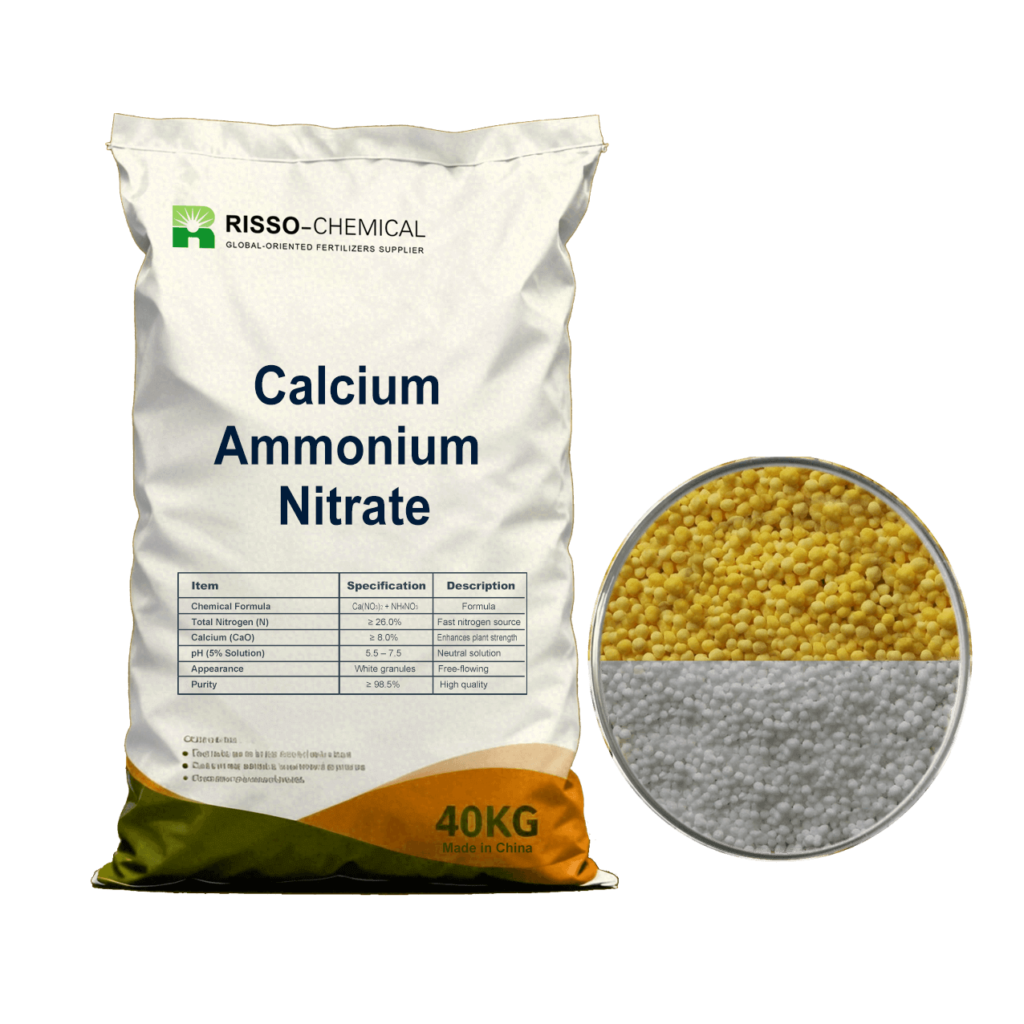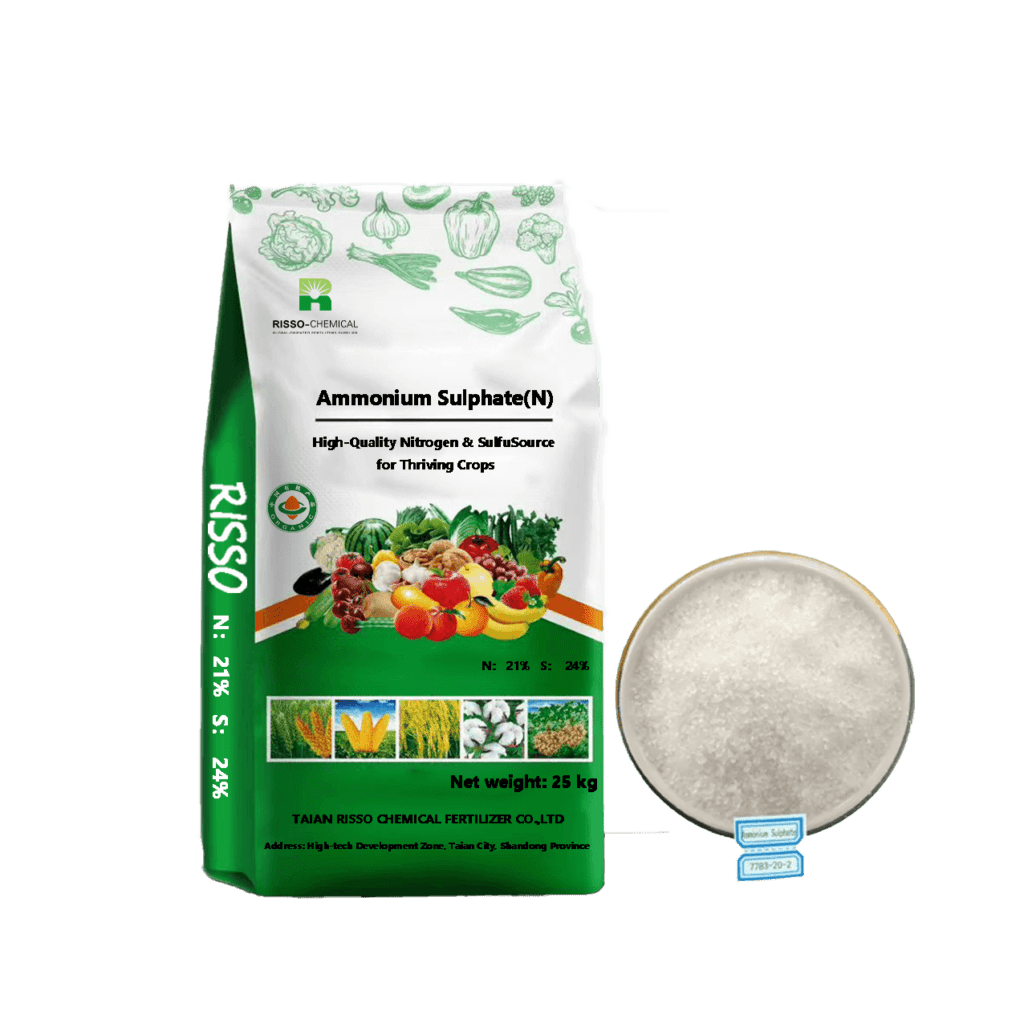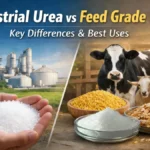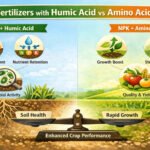Let more growers get greater benefits
Types of Nitrogen Fertilizers: A Complete Guide for Crops
Subtitle: Comprehensive Guide to Nitrogen Fertilizer Categories and Applications
- Industry News
- July 15, 2025
- 9:42 am


Risso Calcium Ammonium Sulfate Fertilizer: Precision Nutrition for Modern Agriculture
Calcium ammonium sulfate is highly suitable for agricultural applications, containing 16%-18% nitrogen (ammonium nitrogen), 12%-14% calcium (soluble calcium), and a small amount of sulfur. It can be applied as a basal fertilizer (20-30 kg per mu, broadcast before tillage) or as a topdressing during the growing season (in furrows or holes), making it suitable for field crops, fruits, and vegetables. It simultaneously supplements nitrogen and calcium, with ammonium nitrogen being easily absorbed and rapidly effective. It also improves soil structure and prevents compaction, making it particularly suitable for acidic soils.
Table of Contents
1. Calcium ammonium sulfate fertilizer – a balanced supply of macronutrients
- Nitrogen: The Powerhouse of Crop Growth
Calcium ammonium sulfate contains 16%-18% nitrogen, all in the ammonium form. This form of nitrogen is directly absorbed and utilized by crop roots without requiring soil transformation, rapidly replenishing the nitrogen nutrients needed for crop growth. This promotes the robust growth of vegetative organs like branches, leaves, and stems, resulting in vibrant green leaves and vigorous growth. It also provides ample “raw materials” for photosynthesis, aiding the accumulation of photosynthetic products and laying the nutrient foundation for subsequent flowering and fruiting. This is particularly suitable for crops during critical nitrogen-requiring stages, such as the seedling and growing seasons.
- Calcium: The Guardian of Crop Health
Calcium contains 12%-14% soluble calcium, offering excellent solubility and mobility, allowing for efficient crop absorption. As an essential macronutrient for crops, calcium’s core functions focus on strengthening their structure and preventing diseases. First, it participates in cell wall synthesis, enhancing its toughness and stability, making crop stems more upright and more resistant to lodging. It also increases the firmness of the fruit peel, reducing damage during transportation and storage. Second, it directly prevents physiological diseases caused by calcium deficiency, such as tomato navel rot, cabbage dry heart, and apple bitter pit, ensuring normal crop growth and fruit quality.
2. Secondary Nutrient Fertilizers —S
Sulfur: A Key Player in Crop Metabolism
Calcium ammonium sulfate contains a small amount of sulfur (usually present as sulfate ions, with the content generally ranging from 8% to 10% depending on the production process). This sulfur exists in a soluble form and is rapidly absorbed by crop roots without soil conversion. It is an essential secondary nutrient for crop growth, with its core functions reflected in two key areas: physiological metabolism and quality improvement.
- Sulfur is a key component of proteins and amino acids (such as cysteine and methionine). It participates in the construction of crop cell structure and the regulation of enzyme activity. It also assists in chlorophyll synthesis, enhancing crop photosynthesis efficiency, ensuring nutrient conversion and accumulation, and preventing problems such as leaf yellowing and growth retardation caused by sulfur deficiency.
- Sulfur is crucial for crop quality, especially in cash crops. For example, in oil crops such as rapeseed and peanuts, it can promote oil synthesis and increase oil content; in vegetables and fruit trees, it can enhance fruit flavor and storage resistance, reduce the occurrence of deformed and hollow fruits, and at the same time improve crop resistance, helping crops resist adverse environmental influences such as drought, pests and diseases.
3. Chelated Micronutrient Fertilizers
Magnesium, iron, and zinc are often overlooked, yet are essential for strong crop growth. Risso offers the following specialty products:
- Magnesium – aids photosynthesis, activates enzymes, and protects leaves of vegetables and fruit trees.
- Iron – participates in metabolism, prevents chlorosis, and increases photosynthetic rates in acidic soils.
- Zinc – regulates growth, promotes rooting and flowering, and reduces leaflet and low yield in crops.
4. Specialty Crop-Specific Fertilizer Blends
- Risso Tomatoes – Calcium supplements prevent navel rot, promotes fruit enlargement and sweetness, and improves fruit quality.
- Risso Cucumbers – Nitrogen promotes leaf growth, calcium strengthens stems and vines, and promotes high and high yields.
- Risso Coffee – Nitrogen supplements promote branching, calcium enhances stress resistance, and improves coffee bean quality.
- Risso Soybeans – Nitrogen promotes strong seedlings, calcium stabilizes rhizobia, and increases bean plumpness.
Why choose Risso nitrogen fertilizer?
✅ Nutrient synergy suitable for crops
✅ Quick and efficient absorption of ammonium nitrogen
✅ High soluble calcium utilization rate
✅ Improve soil quality and prevent compaction
✅ Win-win situation for increased yield and better quality
📌 Final Thoughts
Overall, the core value of calcium ammonium sulfate fertilizer lies in its multifunctional adaptability. It not only meets the key nutrient needs of crops through the synergistic combination of nitrogen and calcium, but also ensures fertilizer efficiency through rapid absorption. It also simultaneously improves soil and enhances crop quality. Whether used in conventional field cultivation or in the cultivation of cash crops like fruits and vegetables, it balances nutrient supply and soil maintenance, providing growers with an efficient and sustainable fertilization option. It is a practical fertilizer that balances yield and quality.
Related nitrogen fertilizers
- Article
What will you get when touch?
✔ Quick & helpful reply within 6 hours.
✔ Tailored solutions for your project.
✔ One-stop product, tech, market
TRENDING
Want to find a China fertilizer manufacturer?
Risso will be your best choice; send us your request for your fertilizer details requirement
TAIAN RISSO CHEMICAL FERTILIZER CO.,LTD.
- Address: High-tech Development Zone, Taian City, Shandong Province
© Copyright 2017 RISSO CHEMICAL. All Rights Reserved.











